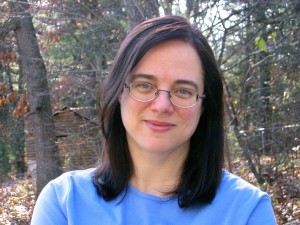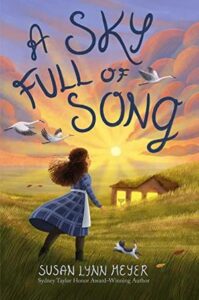I am so pleased to welcome back Susan Lynn Meyer to learn more about her new middle-grade novel, A SKY FULL OF SONG (Union Square Kids, 2023). The story follows a young girl named Shoshana and her family who have fled their home in Russia to create a new life in North Dakota. Like all pioneer families, they face challenges as they settle into their new home so far away from all they know. Despite numerous obstacles, Shoshana and her family find ways to hold on to their Jewish traditions as they build a meaningful life in a new land. Young readers will connect with Shoshana from the start in this engaging read that introduces readers to Jewish pioneers.
What inspired you to write about a Jewish pioneer family?
Hi Barbara, and thanks so much for having me on your blog! The story began when I was looking at a historical photo of a family standing in front of a dugout in Oklahoma with their cat and dog and a patch of irises planted in front of the primitive earthen structure. As I was looking at it, I began to wonder whether any Jews ever homesteaded. It seemed very incongruous to imagine little Jewish children running around the prairie like Laura and Mary Ingalls! So I began to do some research, and I found out, to my surprise, that yes, some Jews did homestead, mostly relatively late, mostly in the early years of the twentieth century. Most came to North and South Dakota where land (often not easily arable land) was still available. They tended to be refugees from oppression in the Russian Empire who for one reason or another preferred the idea of trying to farm rather than settling in the densely crowded cities where most Jews first found places to live on their arrival.

I imagine you did a lot of research. What challenges did you face as a writer, balancing historical facts with storytelling?
I did! I read histories, of course, and I also turned to newspapers, memoirs, and transcribed oral histories, which are often the best sources for writing historical fiction. One challenge I faced was that none of the Jewish settlers in the area where I set the novel mentioned the Native people. Settlers tended to spend their days in a very circumscribed area, mostly struggling to farm their land claims. By the time the Jews began arriving, it had been nearly half a century since the U.S.-Dakota War of 1862 after which the Dakota were displaced onto reservation land, so there are few records of encounters. But I wanted the book to acknowledge that the land hadn’t been empty before Shoshana and her family arrived. When I read more widely in non-Jews’ oral history accounts from this general area and historical period, I found a few mentions of encounters with the Native people, so I felt it was plausible to have Shoshana meet a Dakota girl in town. I felt strongly about making the narrative of that displacement present as context for Shoshana’s story.
Were there any interesting or surprising facts you discovered in your research that didn’t make it into the book?
When writing the scene where Shoshana loses her new-found kitten among the pay toilets in the train station restroom, I needed to make sure that pay toilets existed in this era! So I had to research the history of pay toilets in America. Yes, they did, but they were just starting in 1906. While researching that topic, I learned about the battle to abolish them in the 1970s, which is quite interesting and has to do with arguments about gender equity, but that of course didn’t end up in this novel!
Without giving away spoilers, can you share a bit about how pickle juice came to play a role in this story?
Ah, the pickle juice! How did I first come upon the relevant fact about pickle juice and ice that makes that episode possible? I honestly can’t remember! But I spend a fair amount of time wandering around the internet learning about things, and I may have come upon it while researching winter and blizzard conditions in the Great Plains. Then, of course, I had to try it out myself to be sure what I found out was accurate. So for a while our freezer was full of samples of different kinds of pickle juice (you have to use the right type) that I was attempting to freeze so that I could see what happened!

What do you hope your readers will take away from SKY FULL OF SONG?
I hope to leave readers with an increased awareness of the diversity of experience in what we call the pioneer era. I hope to remind readers of the diversity of peoples on the Great Plains. And I very much hope readers come away with a reverence for the beauty and power of the prairie like the one Shoshana comes to have.
Thank you, Susan.
Susan Lynn Meyer is the author of two previous middle-grade historical novels—Black Radishes, a Sydney Taylor Honor Award winner, and Skating with the Statue of Liberty—as well as three picture books. Her works have won the Jane Addams Peace Association Children’s Book Award and the New York State Charlotte Award, as well as many other honors. Her novels have been chosen as Junior Library Guild and PJ Our Way selections, included among Bank Street College of Education’s Best Children’s Books of the Year, and translated into German and Chinese. She is Professor of English and Creative Writing at Wellesley College and lives outside Boston.